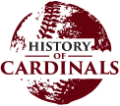Alfredo Cabrera, born in the Canary Islands, becomes the first person from Spain to appear in the majors. The 32 year-old Cardinals shortstop will go 0-for-2 in the only big league game he will play, a 6-5 loss to the Dodgers at Ebbets Field.
His nickname was Pájaro, which is Spanish for “Bird.”
Some of the fans in attendance at Ebbets Field to see Cabrera’s team take on the Brooklyn Superbas that day might have known that they were seeing one of the outstanding Cuban players of his time, but of course the full significance of the moment would have been impossible for anyone to grasp — no one could have known the enormous role Spanish-speaking players and fans would come to play in the game of baseball, or understood the resonance of one of the first great Hispanic players making his only Major League appearance on the same legendary field where another color barrier would be broken 34 years later.
Unlike some of his more fortunate Hispanic contemporaries, who were able to slide for a time around rules against dark-skinned players, Cabrera never got more than one chance in the league. The Cardinals released him, and he went back to Cuba. In baseball parlance, such a brief tenure in the majors is known as a cup of coffee, but Cabrera didn’t even really get that. He had the mug knocked out of his hands mid-sip. He got a taste, sure, but that he never played another game in baseball’s top tier (and that it took him so long to do so in the first place) can in part be attributed to the racism that ruled the day.
Cabrera played in the Cuban League from 1901 to 1920 and was elected to the Cuban Baseball Hall of Fame in 1942. He also managed in the Cuban League and won a championship in the winter of 1915/16 as manager of the Almendares team.
